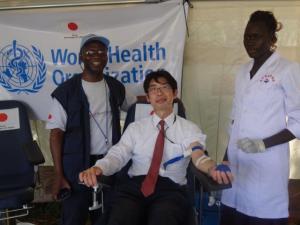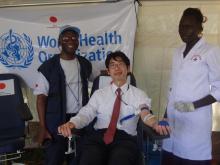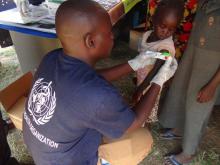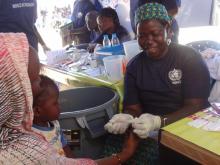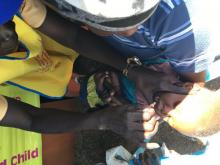WHO conducts integrated health services and blood donation campaign at UN Day celebration
24 October 2016 - As part of the commemorations to mark the 71st anniversary of the United Nations, the World Health Organization (WHO) in South Sudan joined the UN family to provide an integrated health services to the community and organize blood donation campaign in Nyakuron Cultural Center, Juba on 24 October 2016.
Held under the local theme “UN for the people of South Sudan”, the event shed light on the UN’s achievements at the humanitarian level and raises awareness of the efforts of UN family in South Sudan.
WHO’s activities during the UN day included social mobilization activities on immunization, malaria testing, nutrition screening using mid-upper arm circumference (MUAC) measurements and blood donation campaign.
In spite of the prevailing situation in South Sudan, WHO is taking every opportunity to reach the people with health care services.
Immunization best protection against diseases
Immunization is one of the best ways to protect children from serious childhood diseases. Efficacious vaccines not only protect the immunized, but can also reduce disease among unimmunized individuals in the community through indirect effects of herd immunity.
To commemorate UN day and in service to the community, WHO in collaboration with Juba Teaching Hospital (JTH) mobilized and vaccinated 429 children 0 – 59 months with Oral Polio vaccine and 371 with measles vaccine. In addition, 201 children less than one year received Pentavalent vaccine and 169 women 15 to 45 years were also vaccinated with Tetanus Toxoid (TT) Vaccine.
Early detection and referral of children with malnutrition
Acute malnutrition continues to be a major public health concern in South Sudan. To increase treatment and referrals, WHO integrated MUAC screening for acute malnutrition with the immunization activities carried out during the celebration of the UN Day. A total of 70 children were screened for malnutrition and about 3% of the total children screened had acute malnutrition and referred to commence treatment.
Malaria testing to save lives
Malaria is a preventable and treatable parasitic disease. Early detection, timely and correct treatment is a key in reduction of malaria cases.
In line with the local theme chosen by the UN agencies, WHO collaborated with the National Public Health Laboratory to conduct Rapid Diagnostic Test for early and accurate malaria diagnosis that is essential for effective malaria management and surveillance within the community. During the commemoration a total of 337 people were tested for malaria, of whom 66 (44 children under 5 and 22 five years and above including two pregnant women) tested positive and received immediate treatment.
Partnership to boost blood donation
As part of the commemoration to foster the principles of social responsibility, humanitarian and health values, and raising community awareness on the importance of voluntary blood donation to save the life of other people, the World Health Organization (WHO), along with the National Blood Transfusion Services (NBTS), organized blood donation campaign at the premises of Nyakuron Cultural Center, Juba.
The campaign collected 24 blood units during the day. Two thirds of the donations came from members of the local community, reflecting the awareness of the visitors to the importance of donating blood as a humanitarian action. Notable among the donors was the Japanese Ambassador to South Sudan H.E. Mr. Masahiko Kiya, who also volunteer and donated.
Thanks to funding from Japan, WHO and NBTS are able to organize such humanitarian campaigns, which are essential and necessary to help patients that need blood transfusion, and to consistently achieve self-sufficiency in blood and blood products, noting the active role played by the mobile blood bank unit.
_____________________________________
For more information, please contact:
Mr James Chitsva, Blood and Transfusion Safety, Tel: +211954991637, Email: chitsvaja [at] who.int (chitsvaja[at]who[dot]int)
Dr Sylvester Maleghemi, EPI Focal Point, Tel: +211 956 779 467 Email: maleghemis [at] who.int (maleghemis[at]who[dot]int)
Mr Kofi Boateng, EPI Consultant Tel: +211 955 026 052, Email: boatengk [at] who.int (boatengk[at]who[dot]int)
Ms Jane Pita, Lab Technologist, Tel: +211955536818, Email: janep [at] who.int (janep[at]who[dot]int)
Ms Jemila M. Ebrahim, Communication Officer, Tel: +211 950 450 007, Email: ebrahimj [at] who.int (ebrahimj[at]who[dot]int)
_____________________________________
01 The Japanese Ambassador to South Sudan, H.E. Mr. Masahiko Kiya donating blood.
02 A nutritionist does MUAC screening as part of the organisation’s contribution to mark the UN Day.
03 A woman is tested for malaria as part of activities to mark the UN Day. Photo WHO.
04 A child being vaccinated againes Polio in Juba.



